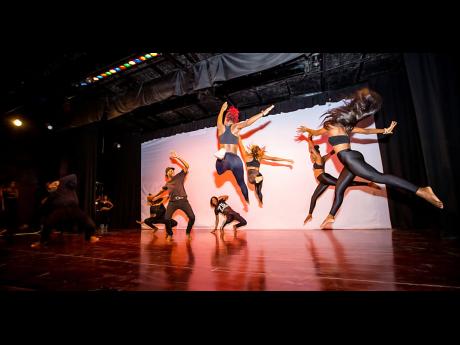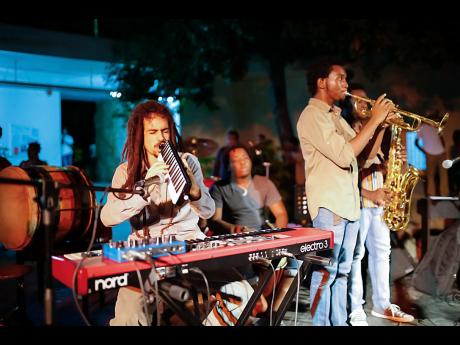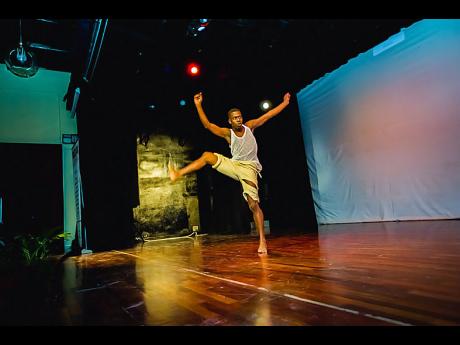Creativity on a crescendo - Training arts professionals for 21st century
Over the last 30 years, Jamaica has seen a focus on the expansion and development of businesses in the visual and performing arts in areas such as visual arts, music, dance, drama, and arts management, among other areas being referred to as the creative industries.
According to research, since the late 1990s, these industries were championed as new sources for economic regeneration, urban development, employment creation, and later, a means to combat social exclusion.
The Edna Manley College of the Visual and Performing Arts (EMCVPA), therefore, plays a central role in education to fuel the development of the creative industries and the workforce.
The college is guided by its mission statement, "to enrich the aesthetic sensibilities and promote the cultural diversity of the Caribbean through the highest-quality education and training in the visual and performing arts" and ten core values incorporating "diversity, service, innovation, transparency, commitment, partnership, lifelong learning, integrity and ethics, truth and respect".
Key role
The mission and core values position the EMCVPA to play a key role in the development of the creative industry, in general, and the visual and performing arts, in particular, in a vast number of ways.
While programmes of the college have been widely accepted and its graduates have proved themselves locally and internationally for many years, it is important that it leads the charge in informing decision-makers, and the wider public, of the importance of education in the arts, the importance of the institution to the development of the creative industries, and its importance to nation building.
The arts are often viewed only for the entertainment value or as a part-time income-earner rather than a profession worthy of the associated respect given to traditionally accepted careers. It, therefore, begs the question, how can we improve support for the mobility of artists and cultural professionals in the anglophone Caribbean?
I have observed that the creative and cultural industries in more recent times have come in for focused attention. However, it requires greater understanding about what this means besides its economic potential, how and what is required to create an environment in which this sector can survive and strive, to fulfil its potential that would enable it to contribute even more to sustainable development, growth and wealth creation.
Access to finance
There is need to provide access to finance, support for training programmes in skills to meet emerging needs or new career paths, and to foster partnerships between the cultural sector and other entities to enhance sustainability.
Arts and culture is a common language, and the Edna Manley College of the Visual and Performing Arts is committed to, and actively involved in, leading the discourse around the importance of the arts to society and fully respects cultural diversities and shares the ideals of UNESCO's declaration concerning Cultural Decade four-point objectives.
These are:
- To acknowledge (and promote) the cultural dimension of development;
- To affirm and enrich cultural identities;
- To broaden participation in cultural life as well as in civil society;
- To promote international cultural cooperation.
It should be understood that the academy is at the core of cultural imperatives. The academy plays an important part in passing on the best of what has been thought about and documented from one generation to the next, while, at the same time, it plays a key role in providing a fertile and nurturing environment within which the imagination and thought processes of ensuing generations develop.
The intellectual pursuits of the various disciplines have, at their core, the generation of new ideas and the articulation and reflection of truths.
One of the ways in which the EMCVPA continues to facilitate change in the creative industries is through creating a space to have dialogue about the creative industries. One such space is the hosting of the biennial Rex Nettleford Arts Conference.
The conference has been staged four times - In 2011, 2013, 2015 and 2017 the conference' focus was on The Arts: Catalyst for Caribbean Development and The Creative Industries: Sustainability and Social Transformation respectively.
Opportunity to dialogue
The Arts Conference presents an opportunity to create dialogue on the relationship of the Arts and economic development as it is central to the development of creative industries. Another important factor is the EMCVPA's role in arts advocacy, incorporating community and stakeholders with educational institutions.
A CARICOM unpublished report confirms that there is significant potential for economic and social development and gains from the development of cultural/creative industries.
This potential is, however, constrained by several factors, including deficiencies in educational offerings within the spheres of early childhood education, secondary education, technical or vocational studies and entrepreneurship, as well as an absence of purpose-built venues, which limits professionalism and growth.
At the same time, interviews with stakeholders located throughout the region revealed that the EMCVPA has significantly impacted the region and their perceptions of the institution as being one that is of a high quality in education and training in the arts, through which significant goodwill can be leveraged. This is corroborated by the outstanding performance and contribution of our graduates across the region.
Notwithstanding, the several challenges facing the arts sector I am optimistic that certain opportunities can rise. The EMCVPA has expert skills and knowledge both in practice and theory that provide a platform to enhance promotion, build human capacity for the creative and culture industries, and to attract investment for the creative sector in Jamaica.
This is consistent with the overall objective of contributing to the creation of a political, regulatory, institutional, and economic environment conducive to the strengthening of the cultural sectors and their actors as a vector for sustainable economic and social and human development.
- Carol 'Annie' Hamilton served as the vice-principal of academic and technical studies at EMCVPA from 2007 - 2018. A textiles graduate of the College (then Jamaica School of Art), she led the revitalisation of academic programmes at the College as it has moved from a diploma-granting to a degree-granting institution. This article is courtesy of The Edna Manley College of the Visual and Performing Arts. Send your feedback to principal@emc.edu.jm.



